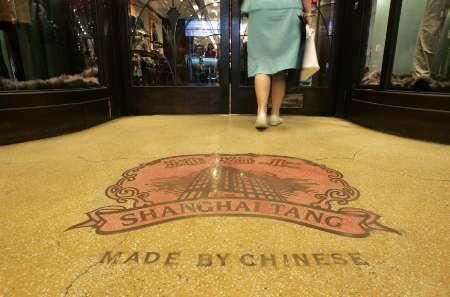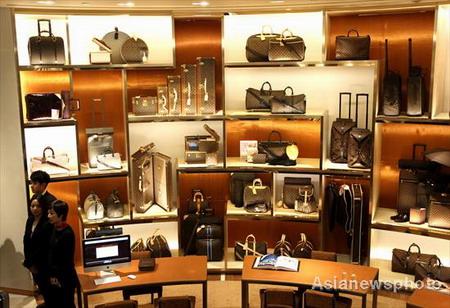
A customer walks into a Shanghai Tang boutique in Hong Kong in this file photo taken in 2007. Shanghai Tang is a designer of brightly colored chic clothing featuring Chinese themes founded in Hong Kong and now with stores worldwide. [Photo / Agencies]
Billionaire investor Warren Buffett, often dubbed the Oracle of Omaha, has seen the future of fashion in the most unlikely of places, bearing a "Made in China" label better known for its cheap than chic.
"I threw away the rest of my suits," beams Buffett in the 2007 video, adding that he and Microsoft founder Bill Gates are fans of Chinese suit maker Trands and would be great salesmen for the company based in the northeast Chinese city of Dalian.
Trands is one of a handful of emerging Chinese brands that someday hope to take on the likes of Gucci, Armani and Prada in the lucrative luxury goods market.
Sales of luxury goods in China grew 12 percent in 2009 to $9.6 billion, accounting for 27.5 percent of the global market, according to Bain & Co. In the next five years, China's luxury spending will increase to $14.6 billion, making it the world's No 1 market.
Buffett's endorsements may make for fun Internet fodder, but analysts point out that the emerging crop of Chinese luxury wannabes face a long uphill battle in taking on the global heavyweights which have more than a century of history and huge marketing muscle.
Compounding the problem is a longstanding association that equates the "Made in China" label with poor quality and mass-market goods, versus the more exclusive cachet of the "Made in Europe" moniker.
"In the short term I don't think any Chinese luxury brands can compete with the international ones in terms of marketing, brand culture, design and quality," said Marie Jiang, JLM Pacific Epoch analyst.
China is expected to become the world's biggest luxury goods market in five to seven years, fueled by increasingly wealthy and brand-conscious consumers who want the best of everything, said a survey by The Boston Consulting Group in January.
That market has been largely dominated to date by the big Western names, most of which have shops in Shanghai and Beijing and are starting to look at smaller cities as well.
But home-grown brands such as Trands are trying to raise their profile both at home and abroad to get a piece of the lucrative luxury pie.
Ports, another luxury fashion maker founded in 1961, made its own splash by wooing celebrities and sponsoring clothing for the 2006 movie "The Devil Wears Prada."
Finicky Consumers

The LV Shanghai flagship store opens on April 28, 2010. [Photo / Asianewsphoto]
Aspiring Chinese luxury brands may face their toughest battle on the homefront, where shoppers often prefer big international names such as France's LVMH or Hermes that carry more prestige and more than a century of history.
One of the few brands to gain anything approaching an international following is Shanghai Tang, a designer of brightly colored chic clothing featuring Chinese themes founded in Hong Kong and now with stores worldwide.
"They are brand conscious, it is a little bit of a show-off attitude and what we have seen is that when they have money, they tend to spend on well-known brands," said Renee Tai, an analyst with CIMB-GK Research, referring to Chinese consumers.
Chinese brands could face an even rougher road ahead as global brands, well aware of China's rapidly growing wealth, launch major expansion campaigns in the country that include opening stores in second and third-tier cities.
Louis Vuitton will open one of its largest stores in the world in Shanghai this year. In the past year, LV has opened stores in second-tier cities of Xian, Xiamen and Tianjin.
London's upscale department store Harrods is also rumored to be in talks with Shanghai's municipal government to open its first store outside the United Kingdom.
International brands are also adapting to China, with Hermes rolling out a new brand, "Shang Xia" offering luxury accessories at cheaper prices just for China.
"They face competition and I think in terms of them being able to take a dominant share of the market, that's sometime off," said Stephen Mercer a partner at KPMG Shanghai.
He said Chinese luxury brands could succeed in niche areas such as spirits and jewelry, with Moutai, a Chinese spirit that was served to Richard Nixon during his famous China trip during his presidency, as one such example.





